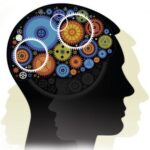
Infra-slow Neurofeedback training is a form of affective state discrimination training within the world of EEG-Biofeedback. Presenting a client with the graphic representation of their slow brainwaves increases awareness of internal states both physiological and emotional. This is not a voluntary process but the end result of the training. Clients feel the impact of this kind of neurotherapy immediately, during the session. Following an optimization process, the client is shifted to a state wherein they are simultaneously most alert and quite relaxed.
Much of the work in psychotherapy is focused on helping the client to identify affective states obvious to the professional but unrecognized by the client. We even have a term for the client who cannot identify their feeling state that is derived from ancient Greek: alexithymia. No words for feelings.
Merely pointing out the obvious physiological manifestations of anxiety or anger or grief is often fruitless. This client habitually exists in a tortured world in which she cannot recognize her own feelings and so is incapable of making good choices. Regular, careful, and patient psychotherapy may result in better skills with respect to the identification of feelings. Neurofeedback can speed this process.
Neurofeedback NYC
A common presentation that is equally debilitating is the client who is overwhelmed by the presence of a specific feeling. This client’s affective experience often becomes chronically attached, as it often is, to representations of past experience in current reality. The chronically anxious patient, for instance, has limited experience of other states of being due to a relentless state of dis-ease. This client becomes conditioned to a reality permeated by constant worry and angst making different emotional response less likely.
In both cases ISF state discrimination training can reacquaint the client with a state of euthymia: a normal non-depressed reasonably positive mood. With the neurotherapists help, ISF training allows the client to distinguish this unfamiliar state in session through a physiological shift in function. The client is taught to identify the feeling of being alert and relaxed: euthymic, by being shifted into that state through ISF training. And with enough repetitions, this state becomes learned behavior. So the alexithymic client is able to differentiate more “difficult” feelings by first being reacquainted with a positive state. The inevitable shift away from euthymia that occurs as matter of course in life is more easily identified and expressed. The anxious client, on the other hand, becomes more able to exist in a state other than anxiety and is better able to identify and manage a range of affective experience.
Neurofeedback NYC
